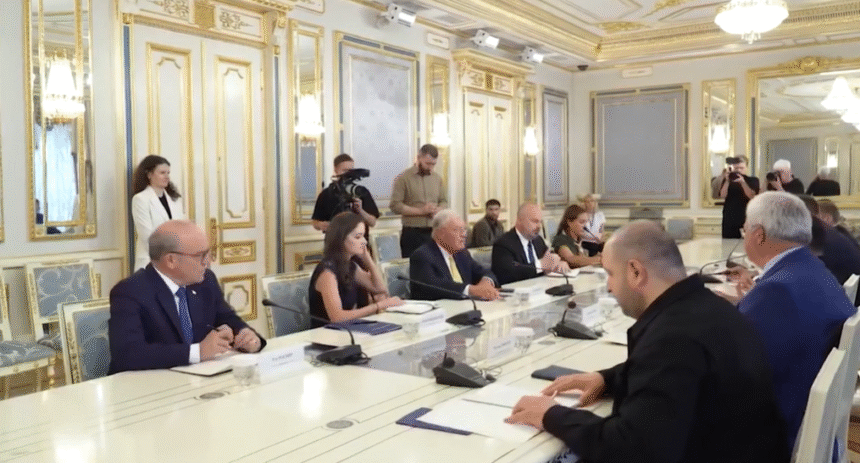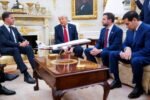Keith Kellogg, U.S. Special Envoy to Ukraine under the Trump administration, met with Ukrainian President Volodymyr Zelenskyy in Kyiv today. The discussions, held amid ongoing air defense warnings, focused on military aid in anticipation of a promised “major statement” from U.S. President Donald Trump regarding Washington’s approach to Russia.
President Zelenskyy, in a post on X, stated, “We discussed the path to peace and what we can practically do together to bring it closer. This includes strengthening Ukraine’s air defense, joint production, and procurement of defense weapons in collaboration with Europe.” He emphasized the importance of “sanctions against Russia and those who help it,” adding that “it is clear that Moscow will not stop unless its unreasonable ambitions are curbed through strength.”
The meeting occurred as Kyiv and other Ukrainian cities have endured intensified heavy air attacks from Russian forces in recent weeks. These attacks have reportedly drawn criticism from President Trump and other Washington officials, leading to questions about Russian President Vladimir Putin’s sincerity regarding peace talks to end the conflict. An air-raid alert was declared in Kyiv shortly after the Kellogg-Zelenskyy meeting, underscoring the ongoing threat.
Trump’s Shifting Stance and Pledge of Patriot Systems
Hours before the meeting, President Trump pledged to send additional Patriot air-defense systems to Ukraine, marking a policy shift that coincides with his promised “major statement” on Russia. While he did not provide specifics on the Patriot deliveries, Ukraine has long sought these systems for defense against escalating Russian airstrikes.
In comments late on July 13, Trump also criticized Putin, stating, “We will send them Patriots, which they desperately need, because Putin really surprised a lot of people. He talks nice and then bombs everybody in the evening…I don’t like it.” He further added, “The European Union is paying for it. We’re not paying anything for it, but we will send it,” without specifying which EU nations would be involved in such a transaction.
This apparent reversal comes after the Trump administration announced earlier this month it was halting some arms supplies to Kyiv. However, Trump has expressed growing frustration with Putin’s refusal to agree to a cease-fire. On July 8, he remarked, “We get a lot of bullshit from Putin. It’s very nice most of the time but meaningless.” Last week, he told NBC News, “I’m disappointed in Russia, but we’ll see what happens over the next couple of weeks.”
While the focus is on Patriot batteries, the news site Axios, citing sources, suggested Trump’s upcoming announcement could include an “aggressive” policy involving offensive weapons. The United States previously delivered three Patriot missile batteries to Ukraine under the Biden administration, with Germany providing three more and a group of European nations contributing one. German Chancellor Friedrich Merz has also raised the possibility of Berlin purchasing Patriots from Washington for subsequent supply to Kyiv.
NATO and Congressional Support
NATO Secretary-General Mark Rutte is scheduled to meet President Trump today, July 14, to discuss Ukraine and other pressing issues. He is also slated to meet with Secretary of State Marco Rubio, Defense Secretary Pete Hegseth, and members of Congress during his two-day visit.
Senator Lindsey Graham, a strong ally of President Trump, added to speculation about increased weaponry for Kyiv, stating, “in the coming days, you’ll see weapons flowing at a record level to help Ukraine defend themselves.” He further told CBS News, “One of the biggest miscalculations Putin has made is to play Trump. And you just watch, in the coming days and weeks, there’s going to be a massive effort to get Putin to the table. This is truly a sledgehammer available to President Trump to end this war.”
Senator Richard Blumenthal, appearing with Graham, noted a growing bipartisan consensus in Congress and among European allies regarding the use of some of the $300 billion in Russian assets frozen by G7 countries to aid Kyiv. “It’s time to do it,” Blumenthal asserted.
Russia has intensified its missile and drone attacks this year, with a monthly increase since December, escalating barrages on Kyiv and other cities while also pushing forward on front lines, albeit with reported heavy casualties.







